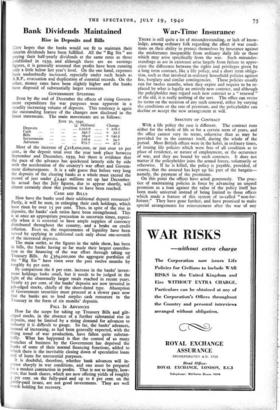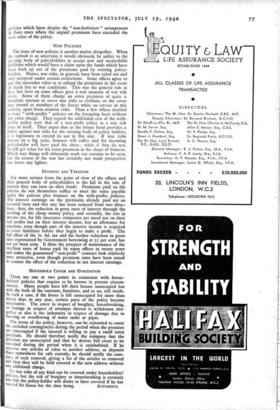War-Time Insurance
THERE is still quite a lot of misunderstanding, or lack of know- ledge, among ordinary folk regarding the effect of war condi- tions on their ability to protect themselves by insurance against the misfortunes inseparable from ordinary daily life or those which may arise specifically from the war. Such misunder- standings as are in existence arise largely from failure to appre- ciate the difference between the rights and privileges given by a long term contract, like a life policy, and a short term obliga- tion, such as that involved in ordinary household policies against fire, burglary and similar contingencies. These policies usually run for twelve months, when they expire and require to be re- placed by what is legally an entirely new contract, and although the policyholder may regard such new contract as a " renewal " of the old, it is really nothing of the sort. The office can revise its terms on the occasion of any such renewal, either by varying the conditions or the rate of premium, and the policyholder can decline or accept the new arrangement at will.
SANCTITY OF CONTRACT
With a life policy the case is different. The contract runs either for the whole of life or for a certain term of years, and the office cannot vary its terms, otherwise than as may be provided for in the contract itself, during the whole of the period. Most British offices were in the habit, in ordinary times, of issuing life policies which were free of all condition as to place of residence, or nature of employment, or the occurence of war, and they are bound by such contracts. It does not matter if the policyholder joins the armed forces, voluntarily or otherwise. If he is killed, the policy is payable, provided, of course, that the assured has kept up his part of the bargain— namely, the payment of the premiums. On this point the offices have acted generously. The prac- tice of maintaining policies in force by advancing an unpaid premium as a loan against the value of the policy itself has been made universal instead of being limited to those offices which made a feature of this system of so-called " non-for- feiture." They have gone further, and have promised to make special arrangements for reinstatement after the war of any policies which lapse despite the ” non-forfeiture " arrangement us those cases where the unpaid premiums have exceeded the cash value of the policy.
NEW POLICIES
The issue of new policies is another matter altogether. When the outlook is so uncertain it would obviously be unfair to the existing body of policyholders to accept new and incalculable liabilities which would have a claim upon the funds which have been built up out of the premiums paid by existing policy- holders. Hence, war risks, in general, have been ruled out and only accepted under certain restrictions. Some offices agree to pay the surrender value or to refund the premiums in the event of death due to war conditions. This was the general rule at first, but later on some offices gave a real measure of war risk cover. Some of them charge an extra premium of quite a moderate amount to cover war risks to civilians, or the cover may extend to members of the forces while on service in this country, apart from aviation risks. Then a few offices decided to issue " with-profits " policies on the foregoing basis without any extra charge. They regard the additional cost of the with- profits policy over that of a non-profit policy as a war risk extra in itself. They argue that as the bonus fund provides a buffer against war risks for the existing body of policy holders, it is legitimate to extend its use in this way. If war risks mature on a big scale, bonuses will suffer and the incoming policyholder will have paid his share ; while if they do not, he will get value for his extra premium in the shape of bonuses. Which way things will ultimately work out remains to be seen, but the course of the war has certainly not made prospective war losses any lighter.
INTEREST AND TAXATION
Far more serious from the point of view of the offices and their general body of policyholders is the fall in the rate of interest they can earn on their funds. Premiums paid on life policies do not themselves suffice to meet the sums payable under the policies plus bonuses on the with-profits policies. The interest earnings on the premiums already paid are an essential item and this rate has been reduced from two direc- tions ; first, the reduction in gross rates of interest through the working of the cheap money policy, and secondly, the rise in income tax, for life insurance companies are taxed not on their real profits but on their interest income, less an allowance for expenses, even though part of the interest income is required to cover liabilities before they begin to make a profit. The full effect of the 7s. 6d. tax and the further reduction in gross rates represented by Government borrowing at 21 per cent. has not yet been seen. It dims the prospect of maintenance of the excellent rates of bonus paid by many offices in recent years and makes the guaranteed " non-profit " contract look relatively more attractive, even though premium rates have been raised to counter the effect of the reduction in net interest earnings.
HOUSEHOLD COVER AND EVACUATION
There are one or two points in connexion with house- holders' policies that require to be known in present circum- stances. Many people have left their houses unoccupied but with the bulk of the contents, furniture, and so on, still inside. In such a case, if the house is left unoccupied for more than ninety days in any year, certain parts of the policy become inoperative. The cover in respect of burglary, housebreaking, or damage in respect of attempts thereat is withdrawn alto- gether as also is the indemnity in respect of damage due to bursting or overflowing of water tanks or pipes.
The terms of the policy, however, can be reinstated to cover the excluded contingencies during the period when the premises are unoccupied if the insured is willing to pay a small extra premium. He should therefore notify the company that the premises are unoccupied and that he desires full cover to be extended during the period when it is uninhabited. If he removes any articles of value to another address, or deposits thgrn somewhere for safe custody, he should notify the com- pany of such removal, giving a list of the articles so removed and then they will be held covered at the new address without any additional chaste. N. o war risks of any kind can be covered under householders' policies, but the risk of burglary or housebreaking is certainly One that the policy-holder will desire to have covered if he has vacated his house for the time being. ACTUARIUS.



































 Previous page
Previous page